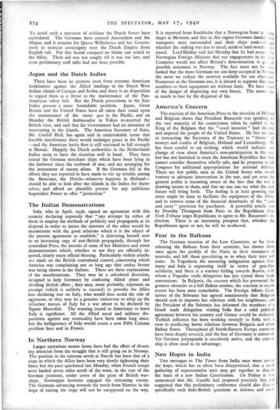Fear in the Balkans
The German invasion of the Low Countries, so far from releasing the Balkans from their anxieties, has shown them once again the perfidy of the Nazis in their treatmein of neutrals, and left them speculating as to when their turn will come. In Yugoslavia the mounting indignation against Ger- many and Italy is expressing itself in terms of pan-Slav solidarity, and there is a warmer feeling towards Russia, with whom a Yugoslav trade delegation has just signed three trade conventions. In Bulgaria, the country which has presented the greatest obstacles to a full Balkan entente, the reaction to recent events has been most remarkable. The Foreign Affairs Com- mittee of the Sobranje has agreed unanimously that Bulgaria should seek to improve her relations with her neighbours, and the President of the Sobranje has informed the members of a Greek trade delegation visiting Sofia that a solid political agreement between his country and Greece would be welcome. Turkish influence has been working strongly in Sofia with a view to producing better relations between Bulgaria and other Balkan States. Throughout all South-Eastern Europe emotions have been deeply aroused, and the fear of Germany is universal. Yet German propaganda is ceaselessly active, and the cenor- ship is often used to its advantage.


































 Previous page
Previous page